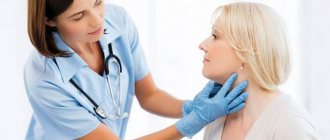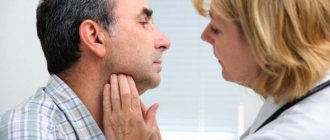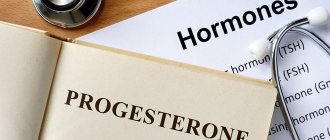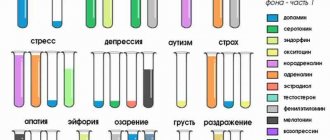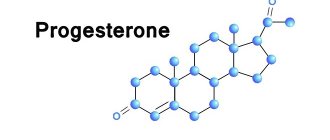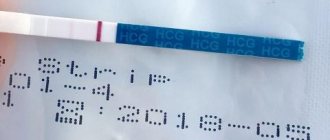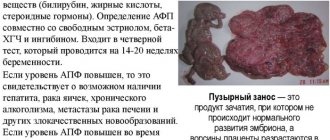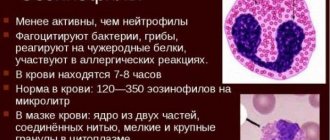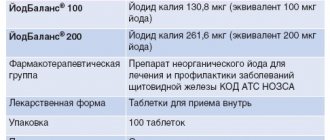Determination of thyroid-stimulating hormone levels is used as a basic test to assess thyroid function in both hypothyroidism and hyperthyroidism. Hypothyroidism
(decreased production of thyroid hormones), characterized by a slowdown in the basic functions of the body: the patient, as a rule, complains of weakness, depression, fatigue, low blood pressure, hair loss, etc. A severe form of hypothyroidism is called myxedema and can lead to heart failure, convulsive syndrome and coma.
Hyperthyroidism
(excessive production of thyroid hormones) is characterized by an acceleration of body functions: patients, on the contrary, complain of rapid heartbeat, restlessness, anxiety, insomnia, and weight loss. The most severe form of hyperthyroidism is thyrotoxic crisis, a life-threatening condition.
Changes in TSH synthesis lead to
- Brain injuries, massive blood loss
and hypothalamic-pituitary diseases, primarily tumors in the hypothalamic-pituitary zone. - Pituitary tumors
(mainly adenomas of the anterior or glandular lobe) cause an increase in the production of pituitary hormones. They, in turn, affect the activity of other endocrine glands (thyroid gland, ovaries, adrenal glands, etc.) and contribute to the development of hypothyroidism, diabetes mellitus and diabetes insipidus, hypothalamic-pituitary insufficiency and endocrine infertility. - Diseases of other endocrine glands
, particularly tumors or adrenal insufficiency, can also suppress or stimulate TSH production. - Hypothalamic-pituitary insufficiency
, which occurs when the pituitary gland and hypothalamic nuclei are damaged due to an infectious process, toxic effects, autoimmune (in which the immune system attacks the body tissues) and vascular diseases, as well as removal of the pituitary gland, is accompanied by a change in TSH levels and requires its control. - Hemorrhage
(hemorrhagic stroke) in the pituitary gland causes a sharp drop in TSH levels, but with this pathology, symptoms of cerebral bleeding (impaired consciousness, severe diffuse headache, photophobia, nausea, repeated vomiting) come to the fore. - In women, TSH levels change during complicated childbirth
or
abortion
, as well as during
pregnancy
. A TSH test is mandatory when screening pregnant women in the first trimester.
Indications for thyroid hormone tests
A doctor may send a patient for thyroid hormone tests in the following situations:
- the patient is suspected of hyperthyroidism or hypothyroidism;
- it is necessary to check the results of hypothyroidism therapy;
- goiter;
- inhibited sexual or mental development in a child;
- absence of menstruation;
- baldness;
- obesity;
- cardiac arrhythmia;
- impotence, decreased libido;
- infertility.
In addition, a thyroid gland test is often performed if cardiovascular diseases do not respond to standard therapy tools for surges in blood pressure or arrhythmia. In some cases, the study is also carried out for connective tissue diseases (systemic) - rheumatoid arthritis, dermatomyositis, and so on. This is necessary because changes in the level of thyroid hormones in the body can complicate the inflammatory process.
Free and total thyroxine
Thyroxine, both total and free, reflects thyroid function. The peak of its content in the blood occurs from 8 to 12 o'clock in the afternoon and in the autumn-winter period. The level of the hormone decreases mainly at night (from 23 to 3 o'clock) and in the summer. In women, the level of thyroxine exceeds its content in men, which is associated with reproductive function.
Reasons for changes in the level of total and free T4:
| Promotion | Decline |
|
|
Tests for thyroid hormones: types
Major thyroid hormones
, which may become the object of laboratory research, are discussed below.
- Thyroid-stimulating hormone (TSH) is a pituitary hormone that activates the formation and secretion of thyroid hormones (T4, T3). If the pituitary gland function is normal, its level in the patient's body increases with a fall and decreases with an increase in thyroid function.
- Free triiodothyronine (free T3) is a thyroid hormone that is responsible for the exchange and absorption of oxygen by body tissues.
- Free thyroxine (free T4) is a substance that activates protein synthesis.
- Thyroglobulin is produced exclusively by the human thyroid gland and is the main element of the thyroid colloid. In fact, TG serves as a marker of neoplasms that are present in the thyroid gland.
- AT-TG (antithyroglobulin antibodies) are antibodies to a protein that is a precursor to thyroid hormones. The results of this study make it possible to diagnose autoimmune thyroid problems in a patient, for example, diffuse toxic goiter, Hashimoto's disease, autoimmune atrophic thyroiditis.
- Microsomal antibodies (Ab-TPO, antibodies to thyroid peroxidase) are antibodies to the cellular enzyme of the thyroid gland. This study is currently considered the most sensitive method for diagnosing autoimmune thyroid diseases.
The turnaround time for thyroid tests and their price depend on the laboratory. It should be taken into account that the normal values of the level of thyroid hormones in the blood are determined by such factors as the age and gender of the patient, and the chosen laboratory method. Therefore, the interpretation of the results must be done by a specialist.
ADDITIONAL STUDIES AND TESTS RECOMMENDED FOR TESTING WITH THYROID HORMONES
Hormonal norm
In the conditions and possibilities of modern medicine, talking about any exact and strict standards for thyroid hormones is no longer relevant. Each laboratory sets its own normal values for the studied parameters of blood and other materials for analysis.
As a rule, the values of standards for each laboratory are determined by the features of the installed equipment, models of research devices, their settings, as well as the reagents used.
Established international standards are taken as the basis for the values , but each laboratory makes its own adjustments to the normal values. Although the difference in standards among many laboratories is small, in some situations it can be quite significant and create a false impression of the patient's condition, as well as lead to an incorrect diagnosis.
The international standard for thyroid-stimulating hormone concentration is considered to be a range of values from 0.4 to 4.0 µIU/ml.
The norm of the T4 hormone in most laboratories ranges from 9 to 19 pmol/l.
The T3 norm according to international standards ranges from 2.6 to 5.7 pmol/l. Determining the concentration of this particular hormone is the most difficult when examining the blood of patients, so most laboratory errors occur precisely in this indicator.
The normal level of antibodies to AT-TPO is usually from 0 to 20 IU/l, but in some laboratories there are values from 0 to 120 IU/l, as well as other data considered normal. Therefore, the forms of each laboratory should always indicate the established standards.
The normal value of antibodies to thyroglobulin ranges from 0 to 4.11 IU/l.
It is also important to remember that the norms largely depend on the patient’s age, as well as his gender.
Ultrasound of the thyroid gland - all about the most important procedure
Published: 02/28/2017
Ultrasound of the thyroid gland - (Thyroid Ultraschall) is the simplest and most highly informative diagnostic method, which provides a detailed assessment of the condition of the gland itself, as well as the anatomical formations adjacent to it - vessels and muscles. This is possible using modern ultrasonic sensors with additional capabilities. In particular, Doppler ultrasound allows you to examine the blood supply to the thyroid gland and nearby lymph nodes. Share link:
Thyroglobulin
Thyroglobulin (TG) is a substrate for the formation of thyroid hormones. The main indication for its determination is the detection of thyroid cancer and monitoring its curability (as a tumor marker). The main reason for the increase in thyroglobulin is a tumor of the thyroid gland with high functional activity. Its concentration decreases when:
- thyrotoxicosis;
- thyroiditis;
- benign thyroid adenoma.
Gynecologist appointment
Published: 01/02/2017
Gynecology is a field of medicine that studies the sexual and reproductive health of the fair sex, and also helps women during pregnancy and childbirth. An appointment with a gynecologist is an obligatory part of every woman’s life.
Other methods for diagnosing thyroid diseases
The condition of the thyroid gland is not assessed, relying only on the results of a bioanalysis of blood and urine. To make an accurate diagnosis, Doppler ultrasound is prescribed. The method helps to identify tumors in the thyroid gland. If a tumor is detected, a puncture biopsy is prescribed to determine whether it is benign or malignant.
For nodular goiter, scintigraphy is indicated, with the help of which it is possible to distinguish the so-called hot nodes (they are treated with medication) from cold ones. The latter lack metabolism, do not produce thyroid hormones and most often must be removed surgically.
Preparing for a blood test for thyroid hormones
Results of a study of thyroid hormone levels
play a huge role in the diagnosis of many diseases.
In order to obtain a reliable picture of the concentration of these substances in the body and timely calculate deviations from the norm, it is necessary to take into account certain preparation rules before conducting tests
related to the field
of endocrinology.
First of all, when planning to take tests for thyroid hormones, the patient must stop taking medications that can affect the function of the gland and contain iodine (especially when it comes to testing for thyroid substances). It is best to do this at least a couple of weeks before the examination, having previously discussed this point with your doctor. If we are talking about monitoring the results of treatment, patients stop taking medications on the day of the tests. In addition, you need to notify your doctor if you are taking oral contraceptives, corticosteroids, tranquilizers, or aspirin.
Treatment of hypothyroidism and thyrotoxicosis
Overt hypothyroidism should always be treated. You will be prescribed thyroid hormone replacement therapy, levothyroxine, which you will need to take for life.
Subclinical hypothyroidism in most cases does not require treatment; tests must be repeated after 3–6 months. The exception is pregnancy, as well as a pronounced increase in cholesterol (> 7 mmol/l). In these cases, even with subclinical hypothyroidism, thyroxine replacement therapy is prescribed.
Manifest (overt) thyrotoxicosis almost always requires treatment. At first I wrote “always,” then, to be fair, I decided to add that there are rare forms that go away on their own. However, thyrotoxicosis always requires consultation with a doctor and observation.
Subclinical thyrotoxicosis does not require treatment, but tests must be repeated after 6 months, there is a possibility of transition to an expanded form.
General rules for preparing for thyroid hormone tests
There are preparation rules that should be followed before conducting all hormonal tests, including before examining the thyroid gland.
- It is advisable to carry out most of the thyroid hormone tests, the purpose of which is to study thyroid hormones, in the morning, that is, before 11 am. The day before, it is forbidden to add too fatty foods to the menu; blood donation is carried out on an empty stomach (at least 8 hours without food).
- A couple of days before taking a blood test, it is imperative to minimize physical activity (it is better to eliminate it in principle), and avoid emotional stress.
- Strict adherence to the daily routine is very important, since the level of thyroid hormones
in the body directly depends on the change in the patient’s waking and sleeping patterns. - The results of the study may be distorted due to factors such as drinking alcohol and smoking. Therefore, it is recommended not to drink alcohol for two days before the test, and to stop smoking approximately 2-3 hours before the test.
- Half an hour before blood sampling, the patient should be in complete psychological and physical peace. Therefore, it is better to come to the laboratory in advance to sit and relax for a while before taking biological material.
- Doctors do not recommend donating blood after physiotherapeutic procedures, surgery and similar procedures; you need to wait a certain time.
- For most tests for thyroid hormones, the phase of the menstrual cycle does not matter; you can ignore it (if the situation is the opposite, the doctor will certainly notify the patient about this).
- Two weeks before the study, stop taking medications that may affect thyroid function;
- If the purpose of a blood test for thyroid hormones
is to monitor the effectiveness of treatment, medication should be stopped on the day of the examination; - You need to notify your doctor if you are taking corticosteroids, tranquilizers, oral contraceptives, or aspirin.
By strictly adhering to simple rules for preparing for tests, you can count on receiving reliable information about the concentration of thyroid hormones in the body, whether the results correspond to the norm or deviation from it.
Who should have their thyroid checked?
Even if a person does not feel pain in the front of the neck, the endocrinologist will definitely prescribe a test for thyroid hormones in the following conditions:
- diffuse (uniform) enlargement of the thyroid gland or the presence of nodes in it;
- impaired swallowing function, lump in the throat;
- in women - menstrual irregularities;
- in men – decreased potency;
- in children - rhinitis in the absence of cold symptoms;
- swelling of the face and limbs;
- sudden weight loss or sudden weight gain;
- feeling of dryness of the mucous membranes of the eyes;
- blood pressure disorders that are difficult to recover with medications.
A pregnant woman needs to have her thyroid checked in the first trimester if she was seen by an endocrinologist before conceiving a child, has type 1 diabetes, or has relatives with problems with the endocrine system.
Basic indicators
Tests for thyroid hormones contain several indicators:
- Thyroid-stimulating hormone controls the brain, is produced in the pituitary gland and ensures the functionality of the thyroid gland. Tests for this substance must be part of the examination if thyroid disease is suspected.
- General triiodothyronine is necessary for the diagnosis of hyperthyroidism, in the treatment of goiter, and as part of L-thyroxine replacement therapy.
- Free triiodothyronine is studied in the process of differential diagnosis of failures and abnormalities in the functioning of the thyroid gland.
- Thyroglobulin is used to assess the level of the protein that makes up most of the thyroid mass. This blood test for thyroid hormones is necessary in the process of monitoring cancer treatment, in the diagnosis of chronic hepatitis, and cirrhosis of the liver.
- Free and total thyroxine is necessary to assess the performance of the thyroid gland.
- AT-TPO is an analysis that is used to detect antibodies to a specific enzyme that is present only in the tissues of the gland.
- AT-TG - a test for antibodies to iodinated protein, T4, T3 are produced from it.
Free and total triiodothyronine
Total triiodothyronine includes protein-bound and free T3. T3 is a very active substance. Its release is characterized by seasonal fluctuations: the peak of its release occurs in the autumn-winter period, and the minimum level is observed in the summer.
Norms of total T3 at different ages:
- 1-10 years – 1.79-4.08 nmol/l;
- 10-18 years – 1.23-3.23 nmol/l;
- 18-45 years – 1.06-3.14 nmol/l;
- Over 45-50 years old – 0.62-2.79 nmol/l.
Why does the indicator of total and free triiodothyronine change?
| Increase | Decrease |
|
|
How to decipher the results
The patient must understand that only a doctor can give a professional assessment of the results of tests for thyroid hormones.
The values of the main indicators of analysis for normal thyroid hormones are discussed below.
| Hormone | Norms | Problems |
| CIA | Normal TSH in humans is 0.4-4 mU/l. The pituitary hormone (thyroid-stimulating) ensures the release and secretion of thyroid hormones. | A lack of TSH may indicate pathologies such as thyrotoxicosis, hyperthyroidism, reduced pituitary function, or its injury. Whereas an excessive concentration of TSH detected during the analysis suggests hypothyroidism, severe mental illness, the development of tumors, and insufficiency of adrenal function. |
| T3 free | Free T3 normally amounts to 2.6-5.7 pmol/l. Free triiodothyrone is responsible for the absorption and exchange of oxygen by tissues. | If the free T3 level becomes higher than normal, this can serve as a signal of thyroid dysfunction, toxic goiter, neurotic syndrome, choriocarcinoma, chronic liver diseases, and so on. A lack of this hormone may indicate hypothyroidism, primary adrenal insufficiency, weight loss, or excess exercise. If the total T3 value exceeds the norm, thyrotoxicosis, iodine deficiency goiter, or pregnancy can be assumed. Whereas a lack of T3 may indicate a reduction in metabolism. The level of this substance is greatly reduced in elderly patients, which must be taken into account when interpreting the analysis of thyroid hormones. |
| T4 free | Free T4 is normally 9-22 pmol/l. Free thyroxine carries out the synthesis of proteins in the body. | If free and total T4 deviate from the norm, a decreased or increased metabolism can be assumed. |
| AT-TG | Normal AT-TG levels are in the range of 0-18 U/ml. Antibodies to the protein are considered an important indicator for diagnosing autoimmune thyroid problems, for example, atrophic autoimmune thyroiditis. | An increase in the concentration of thyroglobulin is possible in case of autoimmune and chronic thyroiditis, thyroid cancer and other complex diseases. |
| AT-TPO | AT-TPO is normally less than 5.6 U/ml. Assessing these indicators is now the most effective method for identifying thyroid diseases that are autoimmune in nature. |
Thyroid-stimulating hormone: normal values
Normally, average TSH levels in the blood vary depending on age, especially changing in the first months of a child’s life.
| Age | TSH concentration, mU/l |
| 4 days – 6 months | 0,73–4,77 |
| 6 months – 14 years | 0,7–4,17 |
| 14–19 years old | 0,47–3,41 |
| > 19 years old | 0,4–4,0 |
During pregnancy, the level of TSH in the blood decreases and the reference values look like this:
| Trimester of pregnancy | TSH concentration, mU/l |
| I trimester | 0,1–2,5 |
| II trimester | 0,2–3,0 |
| III trimester | 0,3–3,0 |
How to interpret changes in the analysis
If the values of thyroid hormone tests deviate from the norm, the following assumptions can be made.
- Primary hypothyroidism is indicated by the following analysis indicators: TSH exceeds the norm, free T3 is normal or reduced, T4 is reduced or corresponds to normal values.
- We can assume secondary hypothyroidism by observing the following picture: TSH is decreased, free T4 is decreased, free T3 is decreased.
- The presence of hyperthyroidism can be indicated by the following indicators: the content of T3 and T4 in the body exceeds normal values, the level of TSH, on the contrary, is reduced.
- And finally, the presence of subacute or autoimmune thyroiditis in a patient is indicated by an increase in AT-TPO and AT-TG levels, which can be combined with hyperthyroidism or hypothyroidism.
Having received tests for thyroid hormones, under no circumstances should you prescribe treatment for yourself after independently interpreting the test results. Only a doctor will be able to evaluate the indicators in aggregate.
The thyroid gland is enlarged, but hormones are normal
The endocrinologist will detect changes in the size of the organ during the examination of the patient. Regardless of the fact that TSH and T4, T3 are normal, the patient’s examination protocol includes:
- analysis of family history - special attention is paid to cases of medullary cancer in close relatives;
- Ultrasound of the organ - with determination of the size of the lobes, the presence of nodes, determination of the echogenicity of tissues, the quality of blood flow in the organ;
- biopsy of nodes to determine their nature.
If the thyroid gland is enlarged and the hormones are normal, the organ does not cause compression of the trachea, aesthetic discomfort, or the nodes are benign, then the patient remains under the care of an endocrinologist. The frequency of the examination is determined by the doctor.
Prices for thyroid hormone tests
The price of hormone tests depends on the specific laboratory. You can get tests at the Diana Clinic at the following prices (excluding discounts). Ask the clinic administrator when making an appointment to find out about discounts on tests.
| [08-118] | Thyroid-stimulating hormone (TSH) | 400 |
| [08-116] | Free thyroxine (free T4) | 485 |
| [08-114] | Free triiodothyronine (free T3) | 450 |
| [08-113] | Total triiodothyronine (T3) | 485 |
| [08-115] | Total thyroxine (T4) | 455 |
| [13-010] | Antibodies to the TSH receptor (anti-pTTH) | 1825 |
| [13-087] | Antithyroglobulin antibodies (antiTG) | 600 |
| [13-088] | Antibodies to thyroid peroxidase (anti-TPO) | 580 |
| [08-051] | Thyroglobulin | 940 |
Antibodies to thyroglobulin and thyroid peroxidase
The detection of these antibodies indicates an autoimmune process, that is, the immune system begins to produce immunoglobulins against its own structures. Antibodies to thyroglobulin and thyroid peroxidase are detected when:
- Graves' disease;
- Down syndrome;
- Turner syndrome;
- subacute thyroiditis (de Crevena);
- postpartum thyroid dysfunction;
- chronic Hashimoto's thyroiditis;
- idiopathic hypothyroidism;
- autoimmune thyroiditis;
- prescribed to newborns with a high titer of AT in the mother.
In these diseases, the antibody titer can be increased 1000 times or more, which is an indirect indicator of the activity of the autoimmune process.
Where to get tested for thyroid hormones
Get tested for thyroid hormones
Without a queue, adults, including pregnant women, can visit the Diana Clinic at a convenient time. You can find out the cost of the listed studies on our website in the price list of services. You can find out more information on preparing to collect material for research on our website in the “Preparation for Analysis” section, as well as from the administrator.
If you find an error, please select a piece of text and press Ctrl+Enter
Submission of analysis
Before carrying out manipulations to collect material, you should remain calm. Endocrine hormones are sensitive to the emotional state of the patient. Blood is drawn from a vein. The optimal procedure time is from 8 to 12 hours. The study of hormones is carried out in blood serum.
The cost of determining hormones in Moscow clinics ranges from 700 rubles and more. Taking blood for testing is included in the cost of the service. When choosing a testing laboratory, you can ask which analyzers are used to analyze samples.
Determination of TSH using a 3rd generation immunochemiluminescence device has an error of ±0.01 µIU/L. For comparison, the error of a similar study using the enzyme immunoassay method (ELISA) is ± 0.5 µIU/l.
When choosing “price or quality,” preference should be given to the latter, although the analysis will cost more.
Hormones can be checked in municipal institutions and commercial clinics. If you are busy at work or in emergencies, you can make an appointment at private medical institutions. In this case, no referral is needed; tests are done on that day. If desired, the analysis protocol can be obtained by email or telephone.
Repeated tests must be done in the same laboratory. This will avoid errors from different equipment, chemical reagents, calibration method and scale, as well as the degree of qualification of laboratory specialists.
For what symptoms should you undergo an emergency examination by an endocrinologist?
Palpation examination of the thyroid gland in a woman by an endocrinologist
Every woman must annually undergo a medical commission, one of the members of which is an endocrinologist.
However, there are a number of symptoms, if you feel them, you should not wait for the next commission, but you should immediately visit the office of a specialized specialist:
- Dysmenorrhea.
- Algodismenorrhea.
- Postmenstrual syndrome.
- Weakness.
- Insomnia.
- Recurrent headache.
- Sleep problems.
- Excessive hair growth.
- Decreased or weakened sex drive.
- Repeated spontaneous abortion.
- Infertility.
Severe headache is one of the symptoms of thyroid dysfunction
The appearance of one or more of these symptoms should prompt the woman to visit an endocrinologist and promptly begin the treatment prescribed by him.

